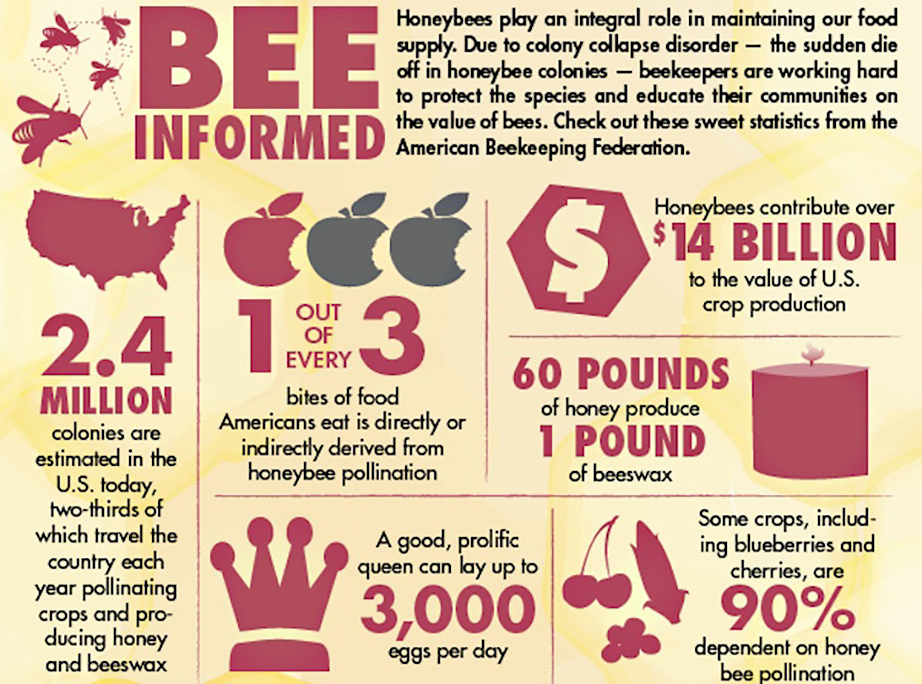National Pollinator Week kicked off this week as beekeepers, farmers, scientists, food movement advocates, and consumers around the country elevate awareness surrounding the plight of bees and other important pollinators.
The non-profit organization Center for Food Safety is one of the key players involved in a national tour to raise awareness on pollinator declines and to demand government action on regulating the use of the toxic pesticides at the crux of this matter.
Pollination is a vital stage in the life cycle of all flowering plants. When pollen is moved within a flower or carried from one flower to another of the same species it leads to fertilization. This transfer of pollen is necessary for healthy and productive native and agricultural ecosystems.
Discover a superfood honey-based fusion that will give you a burst of energy!

Today, almost a decade after directing my film Vanishing of the Bees, there are an overwhelming number of scientific studies linking bee declines to pesticide use, especially neonicitinoids, which are nicotine-based systemic pesticides. These bee-harmful pesticides have many long-term detrimental effects and pose an increased risk to fragile ecosystems.
The Keep the Hives Alive Tour makes its final stop during Pollinator Week in Washington D.C. with a truck carrying 2.64 million dead bees, parking in front of the Environmental Protection Agency and surrounded by beekeepers and concerned citizens demanding action from the agency.
I partook in this event three years ago, protesting in front of the EPA alongside Congressman Dennis Kucinich.
Today we’re still fighting.
“This week and every week we should be doing everything we can to protect bees and other pollinators that are critical to our health and the health of our food system and environment. More than a third of our food is dependent on pollinators and we cannot afford to let their catastrophic declines continue to go unchecked,” said Larissa Walker, Center for Food Safety pollinator program director.
Bees, butterflies, birds, and bats are experiencing alarming population declines that will be devastating to the food system if left unaddressed. Beekeepers across America reported losing a record 44 percent of their honey bee colonies from April 2015 to April 2016 – the second year in a row that colony losses were above 40 percent. This included colony collapse disorder posterboy David Hackenberg who lost 90 percent of his operation a few months earlier.
In the United States pollination contributes $20-30 billion in agricultural production annually. Scientific studies continue to link pesticide use with bee kills and poor colony health.
“The millions of dead bees that have accompanied us during the Keep the Hives Alive Tour are carrying a message,” said Walker. “This is just a tiny fraction of the devastation beekeepers are dealing with year after year. It’s well past time for policymakers to wake up and take action to curb the use of the toxic pesticides that are harming pollinators, people and our environment.”
Pollination Facts
- About 75% of all flowering plant species need the help of
animals to move their heavy pollen grains from plant to
plant for fertilization. - About 1,000 of all pollinators are vertebrates such as birds,
bats, and small mammals. - Most pollinators (about 200,000 species) are beneficial
insects such as flies, beetles, wasps, ants, butterflies,
moths, and bees. - Pollinators are often keystone species, meaning that they are critical
to an ecosystem. The work of pollinators ensures full harvests of
crops and contributes to healthy plants everywhere. - An estimated 1/3 of all foods and beverages is delivered by
pollinators.
Bee The Change You Want To See
- Reduce your impact: Reduce or eliminate your pesticide use, increase green spaces, and
minimize urbanization. Pollution and climate change affect pollinators, too! - Plant for pollinators: Create pollinator-friendly habitat with native flowering plants that
supply pollinators with nectar, pollen, and homes. For information on what to plant in your
area, download a free ecoregional guide online at www.pollinator.org. - Tell a friend: Educate your neighbors, schools, and community groups about the
importance of pollinators. Host a dinner and screen the Vanishing of the Bees educational version.




